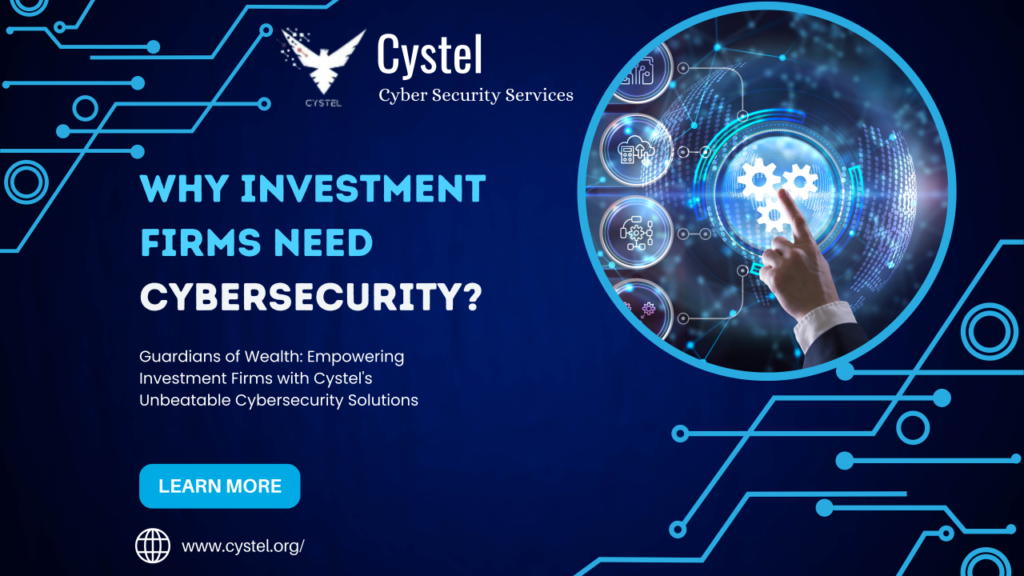Introduction to Cybersecurity in Investment Firms

In today’s digital age, the importance of cybersecurity for investment firms cannot be overstated. These entities manage vast amounts of sensitive financial information, making them prime targets for cybercriminals. The unique threats faced by investment firms range from data breaches and insider threats to sophisticated cyber espionage. Each of these threats has the potential to cause significant financial loss and reputational damage, which can be devastating for firms that thrive on trust and client confidence.
Data breaches are a prevalent concern, often resulting from unauthorized access to confidential client information or proprietary trading strategies. Such breaches can lead to severe financial penalties, legal consequences, and a loss of client trust. Moreover, insider threats, whether malicious or unintentional, can compromise sensitive data, disrupt operations, and provide attackers with an easy entry point into the firm’s systems. Employees with access to privileged information can pose a significant risk if proper monitoring and controls are not in place.
Cyber espionage represents another critical threat, where state-sponsored actors or competitors seek to steal confidential information for economic or strategic gain. This type of threat can undermine an investment firm’s competitive advantage and erode market confidence. Given these varied and sophisticated threats, investment firms must adopt robust cybersecurity measures to protect their assets, maintain client trust, and comply with regulatory requirements.
The financial and reputational damage resulting from cyberattacks can be extensive. Financial losses may stem from direct theft, regulatory fines, legal fees, and the costs associated with incident response and remediation. The reputational impact can be even more damaging, as clients may lose confidence in the firm’s ability to safeguard their investments, leading to a loss of business and market share. This underscores the critical need for investment firms to prioritize cybersecurity as a fundamental component of their operational strategy.
Key Cybersecurity Threats in the Investment Sector
The investment sector, characterized by high-value transactions and sensitive client information, is a prime target for cybercriminals. Among the most prevalent cyber threats faced by investment firms are phishing attacks, ransomware, malware, advanced persistent threats (APTs), and insider threats.
Phishing attacks remain a significant threat, often involving fraudulent emails designed to trick employees into disclosing sensitive information or clicking on malicious links. These emails can appear highly convincing, mimicking trusted sources and leading to substantial breaches. For instance, a prominent investment firm recently fell victim to a sophisticated phishing campaign, resulting in the unauthorized transfer of millions of dollars.
Ransomware is another severe threat, where malicious software encrypts a firm’s data, demanding a ransom for its release. In one high-profile case, an investment firm was forced to pay a seven-figure sum to regain access to critical client and financial data, underscoring the disruptive potential of such attacks.
Malware, including viruses, worms, and trojans, can infiltrate investment firms’ systems through various vectors, such as email attachments or compromised websites. Once inside, malware can steal sensitive data, disrupt operations, or serve as a gateway for further attacks. A notable example involved a malware attack that compromised an investment firm’s trading platform, leading to significant financial loss and operational downtime.
Advanced persistent threats (APTs) are particularly concerning for the investment sector. These long-term, targeted attacks are often orchestrated by highly skilled cybercriminals or state-sponsored actors. APTs aim to steal sensitive information or disrupt operations over extended periods. An investment firm experienced an APT attack that went undetected for months, resulting in the exfiltration of valuable client data and proprietary trading algorithms.
Insider threats, whether malicious or accidental, also pose significant risks. Employees with access to critical systems and data can cause substantial damage if they misuse their privileges. A case in point is an insider at an investment firm who intentionally leaked confidential client information, leading to reputational damage and legal repercussions.
Implementing Effective Cybersecurity Strategies
Investment firms must adopt robust cybersecurity strategies to protect sensitive financial data and maintain client trust. A critical first step in this process is the implementation of multi-factor authentication (MFA). MFA adds an extra layer of security by requiring users to provide two or more verification factors to access accounts or systems. This significantly reduces the risk of unauthorized access, even if passwords are compromised.
Encryption of sensitive data is another fundamental practice. By converting data into a coded format, encryption ensures that even if information is intercepted, it remains unreadable to unauthorized individuals. Both at-rest and in-transit data should be encrypted to maintain confidentiality and integrity.
Regular cybersecurity training for employees cannot be overstated. Human error is often the weakest link in an organization’s cybersecurity chain. Continuous education on recognizing phishing attempts, safe internet practices, and proper data handling procedures empowers employees to act as the first line of defense against cyber threats.
Investment firms should also prioritize the development and maintenance of incident response plans. These plans provide a structured approach to identifying, managing, and mitigating cybersecurity incidents. A well-prepared incident response plan ensures that firms can quickly contain breaches, minimize damage, and recover effectively.
Advanced technologies, such as artificial intelligence (AI) and machine learning (ML), play a crucial role in enhancing cybersecurity measures. AI and ML can analyze vast amounts of data to identify patterns and anomalies indicative of cyber threats in real-time. These technologies enable proactive threat detection and response, significantly improving an organization’s cybersecurity posture.
Adopting a holistic approach to cybersecurity that integrates technology, processes, and people is essential. This comprehensive strategy ensures that all aspects of the firm’s operations are fortified against potential threats. By combining advanced technological solutions with rigorous procedures and well-informed personnel, investment firms can create a resilient cybersecurity framework capable of withstanding the ever-evolving landscape of cyber threats.
Choosing the Right Cybersecurity Solutions
Investment firms face unique cybersecurity challenges that require tailored solutions to safeguard sensitive financial data. Selecting the right cybersecurity solutions involves a thorough evaluation process. One of the primary criteria to consider is the comprehensiveness of the solutions offered by cybersecurity vendors. Firms should ensure that the vendor’s offerings encompass a wide range of protections, including network security, endpoint protection, and advanced threat detection.
Scalability is another crucial factor. As investment firms grow, their cybersecurity needs will also expand. Solutions that are scalable can adapt to the increasing demands without compromising on security. This flexibility is essential for accommodating both current requirements and future growth.
Ease of integration is equally important. The chosen cybersecurity solutions should seamlessly integrate with existing systems and workflows. Investment firms often utilize a variety of software and platforms, and the cybersecurity tools must be compatible with these to ensure a smooth operation without disruptions.
Customer support is a critical aspect of evaluating cybersecurity vendors. In the event of a security breach or technical issue, prompt and effective support can make a significant difference. Vendors that offer robust customer support services, including 24/7 availability, are more likely to provide the necessary assistance during critical moments.
Managed Security Service Providers (MSSPs) present an advantageous option for investment firms. MSSPs offer specialized expertise and resources that can enhance a firm’s security posture. By leveraging the services of MSSPs, firms can benefit from continuous monitoring, threat intelligence, and proactive risk management. This approach allows firms to focus on their core business activities while ensuring robust cybersecurity measures are in place.
Finally, it is imperative for investment firms to regularly review and update their cybersecurity measures. The threat landscape is constantly evolving, and staying ahead requires ongoing vigilance and adaptation. Regular assessments and updates ensure that the firm’s defenses remain effective against emerging threats, thereby maintaining a secure environment for financial operations.

